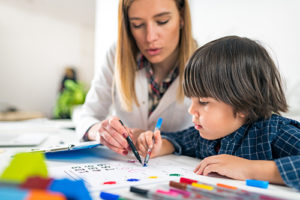 Often, children with autism have trouble with day-to-day functional skills such as how to say ‘no’ or making a decision between two activities. Others have difficulty with self-care or daily tasks such as laundry, cooking, or understanding money. This struggle may lead to misunderstandings, frustration, and problems connecting with others as a child struggles to express their needs or practice a physical skill. Sometimes, it becomes difficult for a child to self-advocate or feel they can perform activities on their own.
Often, children with autism have trouble with day-to-day functional skills such as how to say ‘no’ or making a decision between two activities. Others have difficulty with self-care or daily tasks such as laundry, cooking, or understanding money. This struggle may lead to misunderstandings, frustration, and problems connecting with others as a child struggles to express their needs or practice a physical skill. Sometimes, it becomes difficult for a child to self-advocate or feel they can perform activities on their own.
This lack of independence can cause stress for the whole family, and it’s not always easy finding the right autism therapy programs to fit a child’s needs. While autism may seem overwhelming, early childhood autism functional skills training therapy can offer children and their families support to prepare children for an engaging, healthy, independent future.
When you reach out to EMIT Therapeutics, we offer in-home functional skills autism therapy for children from 1.5 to 18 years of age and their families across New Jersey. Learn more about our functional skills training by calling us today at 908.376.6278.
What Is Functional Skills Training?
Functional skills, or “life skills,” are day-to-day tasks many of us don’t consider: brushing our hair, unloading the dishwasher, making correct change at the store. However, for children with autism, it can be challenging to understand these skills, their importance, and sometimes how to perform them physically. Functional skills, like social skills, are modeled by therapists and parents and practiced by children. We use positive reinforcement and explanation to deepen the child’s understanding of each skill’s value and importance. Functional skills may include:
- Personal care, health, and safety
- Relationships and socialization
- Community and classroom engagement
- Leisure and recreation activities
- Transportation
- Future planning for career paths and employment
It is best to learn and practice functional skills in an informal and personal home environment, such as cooking in a family’s kitchen or washing clothes at the local laundromat. A familiar place can help a child develop consistency and more readily engage in learning and maintaining skills.
Steps of Functional Skills Therapy
Successful functional skills therapy depends on practice and support at home with a general three-step approach:
- Assess skills: Therapists and parents create a list of strengths and improvement areas to focus on to make clear, manageable goals that are easy for a child to understand.
- Teach new skills: Often, therapists will use visual aids, charts, and checklists. These provide support while allowing children to mark their own progress and witness growth through positive reinforcement.
- Practice: Creating practice routines turn practice into habits as children develop life skills.
Together, therapists and families support children on their functional skills development with tools like morning and bedtime checklists. Therapists and families monitor progress alongside children. They provide care and attention to reassessing goals and strategies with each new life skill they learn. These strategies might include daily activities like brushing their teeth or asking to take a break when feeling overwhelmed. With practice and support, tasks that once seemed unmanageable become routine, preparing children with autism for a vibrant, independent life.
Contact EMIT Therapeutics to Learn More
At EMIT Therapeutics, we believe in holistic autism treatment rooted in helping children with autism grow to have a better life. We tailor our treatments to each child’s needs through early intervention programs and therapies such as:
- Individual therapy
- Family therapy
- Applied behavioral analysis
- Social skills therapy
- Speech therapy
In the comfort of your own home, we provide your child with the tools they need for a bright future. You’ll also get the support you need to help your child succeed and understand the world around them. Contact us online today or at 908.376.6278 to begin functional skills training therapy.

